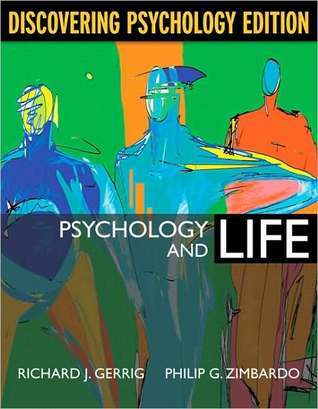What do you think?
Rate this book


784 pages, Paperback
First published January 1, 1977
• Use framing to orchestrate a more positive outlook. This is a classic concept I've encountered through behavioral economics, but it's worth sharing, anyway: people's happiness with their decisions stems largely from the frames they use in making those decisions (Kahneman, 1992). A "frame" is the way we describe our choices to ourselves; it affects how a decision is made and which option is ultimately exercised. For example, people were more likely to buy "75% lean" meat as opposed to "25% fat" meat (even though, duh, it's the same thing). Similarly, people would be happy with a $1000 raise out of the clear blue sky, but if they were expecting a $10,000 raise? Probably not so much. I think it also dovetails with spending patterns and consumptive choices; we're only happy with out car until our neighbor drives up with a newer one. Also related to framing: people have the greatest regrets about their education and careers: areas where they're confronted with a wide variety of opportunities. Also, there's a part of our brain called the putamen that shows a lot of activity when we're confronted with missed opportunities (Büchel et al., 2011).
• Fundamental Attribution Error (FAE) will change your perspective on everything. This impressive-sounding acronym refers the the tendency to blame or credit people for their actions before acknowledging the environment in which they act (Ross 1977). A lot of conservatives are patently guilty of this: assuming that inner city youths should just get a library card and stay in school. (No, I am not making this up.) We tend to overestimate the dispositional factors ("She didn't smile on the street; she must hate me!") and underestimate the situational ones (she had a bad day at work/was in a hurry/had a headache/was just spacing out). This is a hugely valuable concept to keep in mind, particularly if, like me, you're prone to taking things personally.
• Your opinion on psychological adaptivity indicates how much your own personality can change. Do you think people are capable of changing their most basic personal qualities? Whether you answered yes or no, you're probably right about one person: yourself. Psychologists refer to "entity theory" and "incremental theory" (Beer, 2002; Plaks et al., 2009); entity theorists believe that people's natures are essentially fixed, while incremental theorists contend that people can change drastically. The perspective that resonates with you likely describes how your own brain operates, and thus acts as a proxy for your own psychological flexibility.
• Constantly trying to make the "best" decision is probably doing more harm than good. When I read this section, I actually laughed out loud; it encapsulates my daily frustrations so perfectly that the words practically jumped off the pate and slapped me in the face. According to research (Parker et al., 2007; Schwartz et al., 2002; Iyengar et al., 2006), there are two kinds of decision makers: maximizers and sacrificers. Maximizers want to get the best deal. They take longer to make daily decisions. They make more money because they generally hold out for, and take the necessary steps to achieve, higher-paying positions. They are generally more stressed, tired, anxious and overwhelmed than their counterparts; sacrificers are the exact opposite. They're decisive, even at the cost of being sure they made the "best" decision. They're less wealthy and less successful, but generally happier.
• Linguistic relativity blows my mind. Ever since watching this TED Talk about how verb tenses (or lack thereof) correlate with savings rates, I've been actively on the hunt for more about this fascinating area of study. It turn out there's a whole trove of research about "linguistic relativity"; the structure of our language really can change the way we think and interact with the world. I haven't had a chance to really delve here, so if anybody has more research about this topic, I would love to hear about it.
• Block test anxiety by writing about it. Test anxiety can be mitigated through writing about one's apprehensions (Ramirez & Beilock, 2011). When you're focusing on the test result, you're exhausting your working memory and repressing knowledge that might actually help you test well. Writing out your anxious feelings—about a test, a job interview, anything—allows your brain to dump all that stuff before the big day.
• Test yourself to remember more. Give yourself a test on the stuff you're trying to commit to memory (Roediger & Butler, 2011). This is known as the "testing effect". People who took tests, as compared with a group that studied twice as long, showed better long-term retention. Another cool concept is retrieval practice: repeatedly studying and then attempting to recall the information. (You'll never guess what I've been doing to prepare for this test.)
• Money can buy happiness, but only when you're broke. Another one borrowed from economics textbooks: the marginal value of money—the amount of utility provided by extra income—is highest around $0. (That's also why gambling is so appealing for people with lower incomes.) When people struggle to make ends meet, they often report low levels of life satisfaction and happiness (Diener et al., 2010; Howell & Howell, 2008). Additional income does correlate with increased happiness, but only to a point.
• Normative influence makes us do stupid stuff. Rational as we (think we) are, we're actually pretty easily swayed by other people's faulty thinking. Asch (1952) showed that people "went with the crowd" and made incorrect choices on simple observational tests; they believed other people before they believed their own eyes! Certainly this has some evolutionary advantage—maybe you don't see the charging tiger, but that caveman does so you run—but it can also allow a sort of groupthink to override our own rationality.